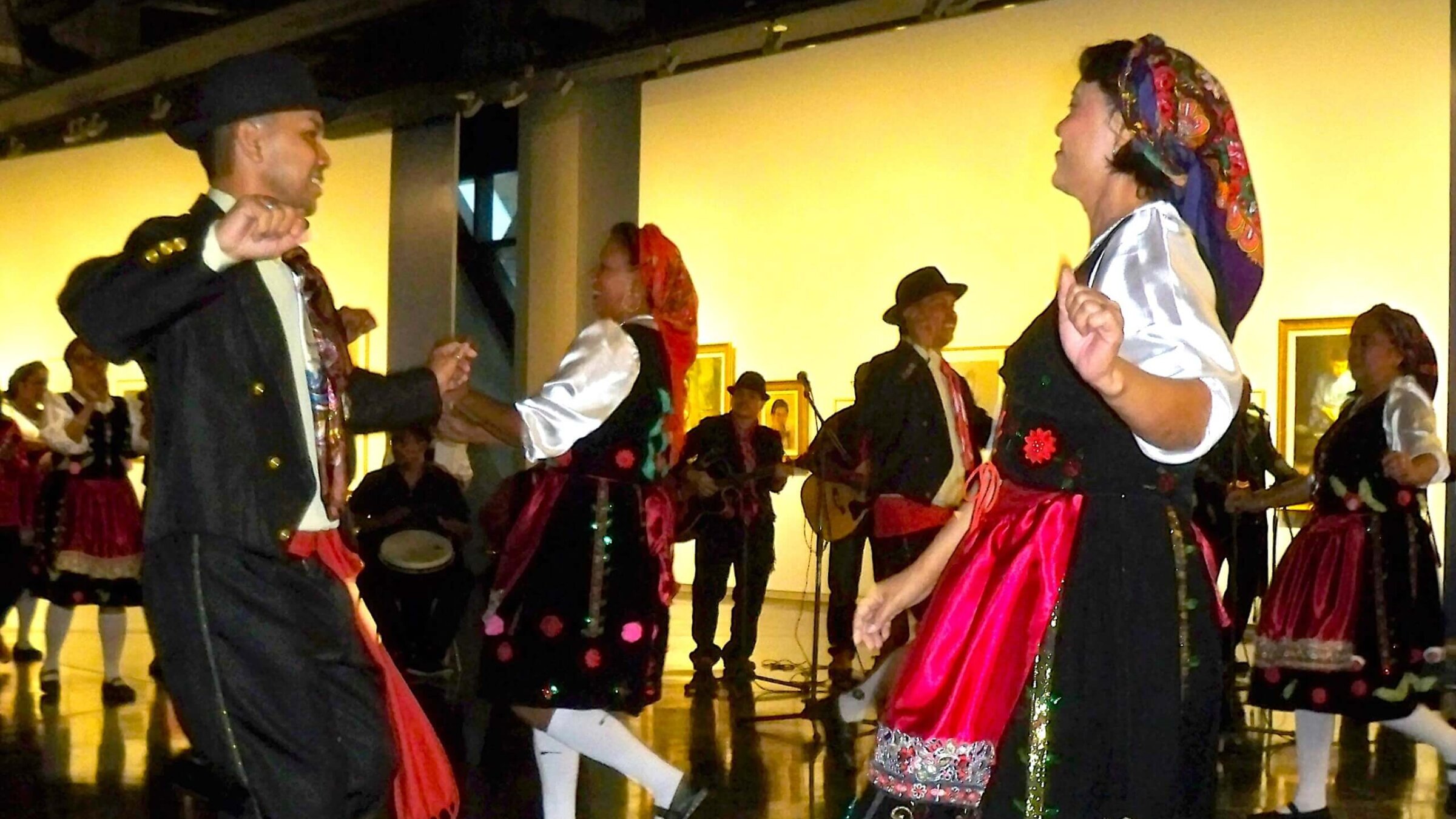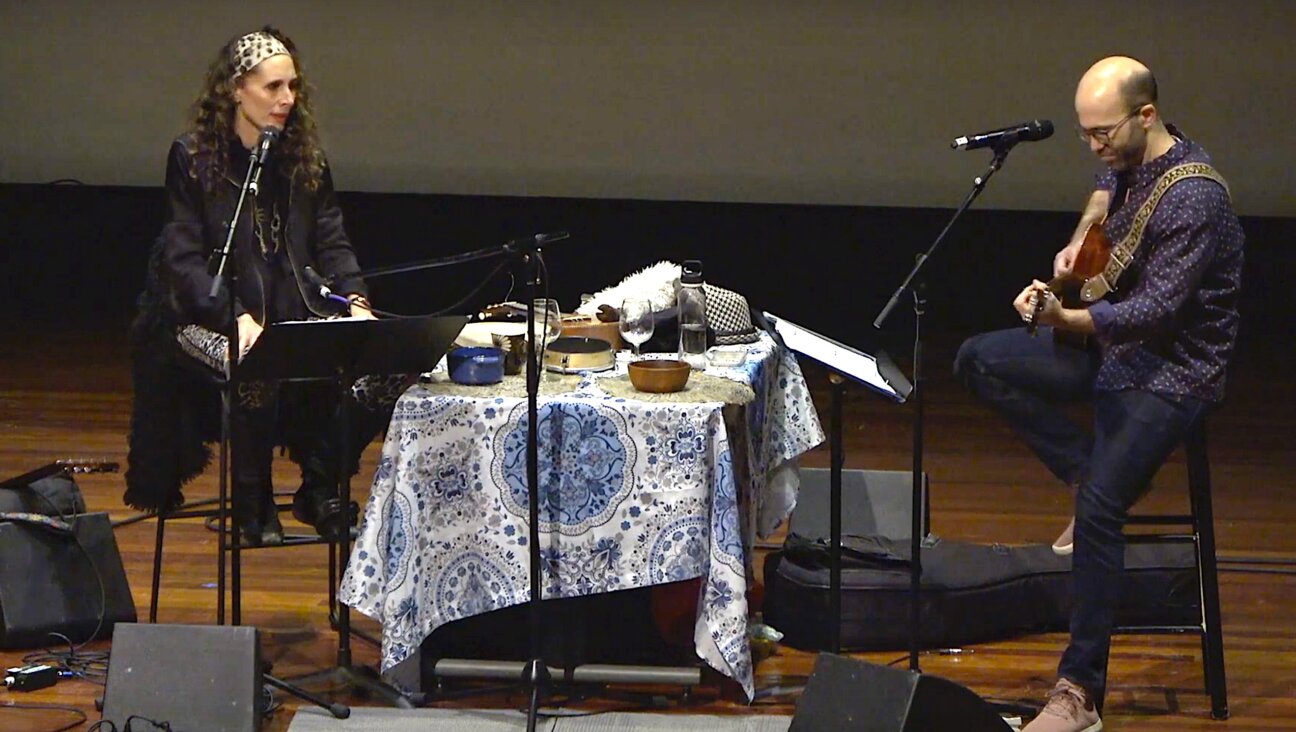Asian descendants of hidden Jews maintain their languages
The work of Kristang language activists has something in common with that of the Yiddishists

A Kristang folk dance Photo by Victor Pogadaev/Wikimedia Commons
Today, Portugal is only a small European country, but it used to be one of the world’s largest and longest-lived maritime empires. The most well-known of its former colonies is Brazil. Many African countries, too, speak Portuguese to this day as a colonial legacy: Angola, Mozambique, Cape Verde, Guinea-Bissau, São Tomé and Príncipe.
However, few people know that aside from its South American and African possessions, Portugal once controlled many port cities throughout Asia. Almost every area that used to be part of the Portuguese Empire is home to small ethnic groups of mixed heritage such as the Macanese in Macau, China, and the Kristang people in Singapore and Malaysia.
Mixed ancestry isn’t the only thing that distinguishes them from the rest of the local population. They also belong to a different faith than most people in their respective countries and speak unique languages of their own. Both the Macanese and the Kristang are often described as tight-knit and somewhat closed-off communities which preserve their traditions, refuse to assimilate and are disproportionately successful in business, research and art. These stereotypes are similar to what people say about Jews, and this isn’t a mere coincidence.
The Macanese and the Kristang are creole peoples; that is, descendants of marriages between European settlers, most of them Portuguese, and various peoples indigenous to the former colonies, such as Malays and the Chinese. So what is the Jewish connection? Many of those who left Portugal in the 16th century were Sephardim. They were anusim or “conversos” – Jews who were forced to convert to Catholicism under the pressure of the Inquisition. In some cases, conversos managed to preserve their Jewishness in secret, but most of the Sephardic-Asian creoles have become genuine Christians. Today, Christianity is an important part of the culture and ethnic identity for the Macanese and Kristang people. It’s even in the name: The term “Kristang” comes from the Portuguese word for “Christian.”
Nevertheless, there are Kristang people interested in learning about their forgotten Jewish heritage. One of them, Edgar Pinto, founded the Kristang Community for Cultural Judaism and wrote a book about the Jewish history of Malaysia and the Inquisition which persecuted heretics and non-Christians even in the Spanish and Portuguese colonies in Asia.
Aside from the Jewish past and the Christian present of the two creole communities, language is what makes them different from their Chinese and Malay neighbors. Macanese and Kristang are creole languages, just as mixed as their speakers.
Most Kristang words come from Portuguese, but they’re pronounced differently and the grammar is much simpler. In Kristang, the Portuguese word for “tomorrow” (amanhã) has become amiang. Instead of the Portuguese serviço (“work”), Kristang people say sibrisu. Many other words come from Asian languages: makan (“eat”) is from Malay and tata (“grandfather”) is from Tamil.
In Macanese, one can even find words that combine elements of two languages. Portuguese for “bread” is pão, pronounced like “pow,” and the Chinese call it mianbao. Cantonese, a language closely related to Mandarin and spoken in and around Macau, renders the same root as minbaau. The Macanese Creole version is min-pau – a Cantonese borrowing which must have switched “b” for “p” under the influence of Portuguese.
Today, the two unique creole languages are threatened by extinction. Malaysia, home to many of the Kristang, is often described as an Islamic ethnostate which isn’t very tolerant to its ethnic, linguistic and religious minorities. In Singapore, the political situation is better, but it’s a very modern, highly globalized city where English is displacing all other languages as the primary tool of interethnic and international communication.
Macau, where the Macanese language originated, was a Portuguese territory up until the 1990s. After over 400 years of Portuguese colonial rule, it was handed over to China in December 1999. A few decades of intense migration from other Chinese cities have followed, and the Macanese creoles have become a minority in their own city.
Dóci Papiaçám di Macau (“The sweet speech of Macau”) is a theater troupe which performs exclusively in Macanese to help preserve the language. Their performances and music videos remind me of the Jewish longing for the shtetlekh of the old country. The artists sing about narrow streets with clotheslines where all neighbors know each other and speak the same language, Macanese, while today’s Macau is a global city with giant skyscrapers and shiny casinos.
The work of Kristang language activists is different, but it also reminds me of today’s Yiddishists. They offer online language classes and organize workshops where linguists, together with ordinary Kristang speakers, help invent new words for modern concepts. The newly coined terms are then published on a website named Jardinggu, itself a neologism combining the Kristang words for “garden” and “language.” Other recent additions to the vocabulary include lumikumiria (“photosynthesis,” combining the words for “light” and “eating”) and palarais (“etymology,” combining “word” and “root”).
The activists’ work is, without doubt, interesting to observe and beneficial to the language community. Sadly, it doesn’t guarantee that Kristang will survive as a living language for future generations.























